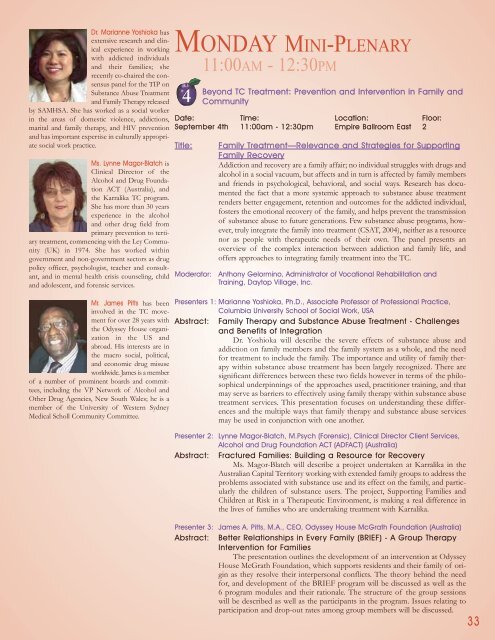East New York - World Federation of Therapeutic Communities ...
East New York - World Federation of Therapeutic Communities ...
East New York - World Federation of Therapeutic Communities ...
You also want an ePaper? Increase the reach of your titles
YUMPU automatically turns print PDFs into web optimized ePapers that Google loves.
Dr. Marianne Yoshioka has<br />
extensive research and clinical<br />
experience in working<br />
with addicted individuals<br />
and their families; she<br />
recently co-chaired the consensus<br />
panel for the TIP on<br />
Substance Abuse Treatment<br />
and Family Therapy released<br />
by SAMHSA. She has worked as a social worker<br />
in the areas <strong>of</strong> domestic violence, addictions,<br />
marital and family therapy, and HIV prevention<br />
and has important expertise in culturally appropriate<br />
social work practice.<br />
Ms. Lynne Magor-Blatch is<br />
Clinical Director <strong>of</strong> the<br />
Alcohol and Drug Foundation<br />
ACT (Australia), and<br />
the Karralika TC program.<br />
She has more than 30 years<br />
experience in the alcohol<br />
and other drug field from<br />
primary prevention to tertiary<br />
treatment, commencing with the Ley Community<br />
(UK) in 1974. She has worked within<br />
government and non-government sectors as drug<br />
policy <strong>of</strong>ficer, psychologist, teacher and consultant,<br />
and in mental health crisis counseling, child<br />
and adolescent, and forensic services.<br />
Mr. James Pitts has been<br />
involved in the TC movement<br />
for over 28 years with<br />
the Odyssey House organization<br />
in the US and<br />
abroad. His interests are in<br />
the macro social, political,<br />
and economic drug misuse<br />
worldwide. James is a member<br />
<strong>of</strong> a number <strong>of</strong> prominent boards and committees,<br />
including the VP Network <strong>of</strong> Alcohol and<br />
Other Drug Agencies, <strong>New</strong> South Wales; he is a<br />
member <strong>of</strong> the University <strong>of</strong> Western Sydney<br />
Medical Scholl Community Committee.<br />
MONDAY MINI-PLENARY<br />
11:00AM - 12:30PM<br />
Beyond TC Treatment: Prevention and Intervention in Family and<br />
Community<br />
Date: Time: Location: Floor:<br />
September 4th 11:00am - 12:30pm Empire Ballroom <strong>East</strong> 2<br />
Title: Family Treatment—Relevance and Strategies for Supporting<br />
Family Recovery<br />
Addiction and recovery are a family affair; no individual struggles with drugs and<br />
alcohol in a social vacuum, but affects and in turn is affected by family members<br />
and friends in psychological, behavioral, and social ways. Research has documented<br />
the fact that a more systemic approach to substance abuse treatment<br />
renders better engagement, retention and outcomes for the addicted individual,<br />
fosters the emotional recovery <strong>of</strong> the family, and helps prevent the transmission<br />
<strong>of</strong> substance abuse to future generations. Few substance abuse programs, however,<br />
truly integrate the family into treatment (CSAT, 2004), neither as a resource<br />
nor as people with therapeutic needs <strong>of</strong> their own. The panel presents an<br />
overview <strong>of</strong> the complex interaction between addiction and family life, and<br />
<strong>of</strong>fers approaches to integrating family treatment into the TC.<br />
Moderator: Anthony Gelormino, Administrator <strong>of</strong> Vocational Rehabilitation and<br />
Training, Daytop Village, Inc.<br />
Presenters 1: Marianne Yoshioka, Ph.D., Associate Pr<strong>of</strong>essor <strong>of</strong> Pr<strong>of</strong>essional Practice,<br />
Columbia University School <strong>of</strong> Social Work, USA<br />
Abstract: Family Therapy and Substance Abuse Treatment - Challenges<br />
and Benefits <strong>of</strong> Integration<br />
Dr. Yoshioka will describe the severe effects <strong>of</strong> substance abuse and<br />
addiction on family members and the family system as a whole, and the need<br />
for treatment to include the family. The importance and utility <strong>of</strong> family therapy<br />
within substance abuse treatment has been largely recognized. There are<br />
significant differences between these two fields however in terms <strong>of</strong> the philosophical<br />
underpinnings <strong>of</strong> the approaches used, practitioner training, and that<br />
may serve as barriers to effectively using family therapy within substance abuse<br />
treatment services. This presentation focuses on understanding these differences<br />
and the multiple ways that family therapy and substance abuse services<br />
may be used in conjunction with one another.<br />
Presenter 2: Lynne Magor-Blatch, M.Psych (Forensic), Clinical Director Client Services,<br />
Alcohol and Drug Foundation ACT (ADFACT) (Australia)<br />
Abstract: Fractured Families: Building a Resource for Recovery<br />
Ms. Magor-Blatch will describe a project undertaken at Karralika in the<br />
Australian Capital Territory working with extended family groups to address the<br />
problems associated with substance use and its effect on the family, and particularly<br />
the children <strong>of</strong> substance users. The project, Supporting Families and<br />
Children at Risk in a <strong>Therapeutic</strong> Environment, is making a real difference in<br />
the lives <strong>of</strong> families who are undertaking treatment with Karralika.<br />
Presenter 3: James A. Pitts, M.A., CEO, Odyssey House McGrath Foundation (Australia)<br />
Abstract: Better Relationships in Every Family (BRIEF) - A Group Therapy<br />
Intervention for Families<br />
The presentation outlines the development <strong>of</strong> an intervention at Odyssey<br />
House McGrath Foundation, which supports residents and their family <strong>of</strong> origin<br />
as they resolve their interpersonal conflicts. The theory behind the need<br />
for, and development <strong>of</strong> the BRIEF program will be discussed as well as the<br />
6 program modules and their rationale. The structure <strong>of</strong> the group sessions<br />
will be described as well as the participants in the program. Issues relating to<br />
participation and drop-out rates among group members will be discussed.<br />
33


